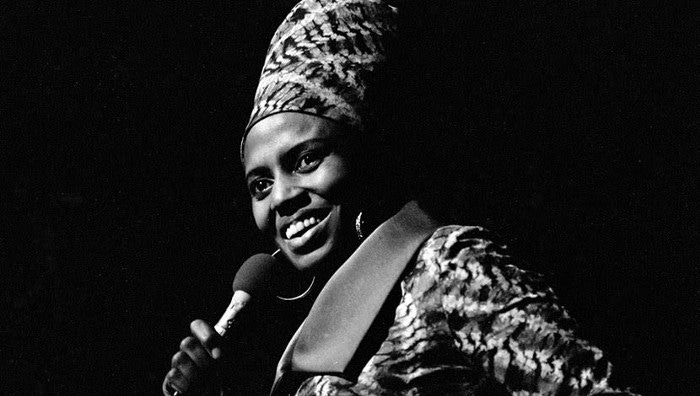Mama Africa and the Empress of African Song may seem like strong epithets, but in the case of Miriam Makeba they are certainly fitting. ‘The Click Song’ highlights Makeba’s charisma and the incredible voice that took her from South Africa to a position of global acclaim, a position from which she made her most strident stands against the injustices of the apartheid regime.
Miriam Makeba’s story is one of youthful success, followed by exile, political turmoil, and return. Within a year of her birth Makeba was imprisoned - her mother was arrested for selling bootleg beer and had no-one to look after her daughter, so they were put in jail together. From a young age Makeba realised that music was a magical tool that could change the trajectory of her life. She began to make a name for herself by singing in local jazz bands and appeared in two films; the second of which was called Come Back Africa, a dramatised documentary on black life in South Africa. Makeba’s singing in the film was noticed and she was invited to a screening in Venice - she became an instant star. Encouraged by Harry Belafonte, the pioneering calypsonian, she went to New York to cut some solo recordings. At this stage, she had begun to voice her opposition to the apartheid regime and when she tried to return to her homeland in 1960, she realised that her passport had been revoked. So began thirty years of exile from her country.
Her career skyrocketed while in the US. She was hugely popular and performed alongside such icons as Marilyn Monroe. During this time she also married Hugh Masakela, South Africa’s most famous trumpeter. She went back to Africa periodically (although never to South Africa) spending time in Guinea and singing for Emperor Haile Selassie. She addressed the UN, speaking about apartheid, and became increasingly involved in the black consciousness movement. In Guinea she met and married Stokely Carmichael, the head of the black panther movement. This proved damaging to her showbiz reputation in the US and much of Western Europe as it linked her to Carmichael’s radicalism. Again she suffered somewhat of an exile as she was not welcome in the US. She eventually split with Carmichael and moved to Belgium, marrying an airline executive.
Makeba continued to perform and to champion social causes as she rebuilt her reputation among western audiences. Her musical and political prominence continued to rise, and when Nelson Mandela was released from prison and apartheid ended, Makeba was the first choice to perform at the celebration festival. Oddly, few South Africans were familiar with her or her activism as the old regime had banned much of her music. Nevertheless, her life and career come across as a monumental battle characterised by success and struggle, her strong and clear voice coming through her music and her activism throughout.
Sources:




